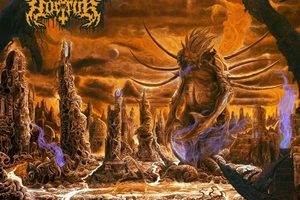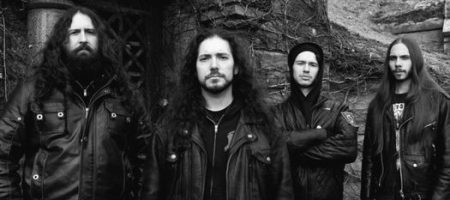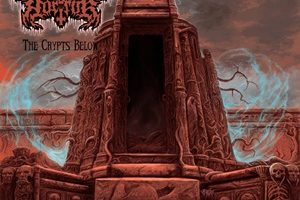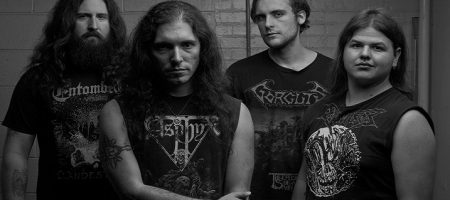Sentient Horror- A Morbid Afterglow
Saturday, 21st December 2019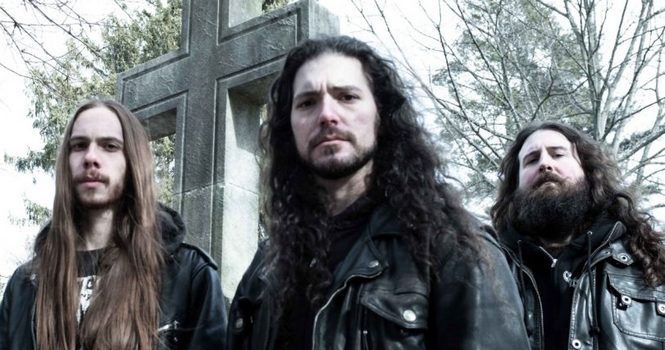
Shifting from a power/progressive/thrash act like Dark Empire into a death metal outlet like Sentient Horror may seem odd to some, but if you know the affinity guitarist/vocalist Matt Moliti has for both styles it makes total sense. It’s not often that you’ll hear a US band embrace the spirit and quality of European death metal, especially the early upstarts like Entombed, Grave, Dismember, and Unleashed – but the deeper you take in the music of this band, you’ll know that they also love other US/European artists that are not Swedish in their heaviness and musical quality. Their second full-length Morbid Realms contains another ten tracks of sheer brutality amidst down tuned aesthetics and shifts of tempos/hooks that will catch listeners by surprise.
We reached out to Matt by phone and he was happy to bring us up to speed on the new record, the horror/fictional inspiration to many of the lyrics, his day job work as a guitar instructor and what he gets out of it, as well as deeper thoughts on his favorite bands/musicians in death metal and what the future holds for Sentient Horror.
Dead Rhetoric: What’s the status of filling the drum position for the band at this point – as you had session drummer Sean Meyers for the record?
Matt Moliti: Um- actually Sean didn’t actually play on the record. The drums are programmed. And he’s credited because he’s going to be our current fill-in drummer and he also helped program the drum parts so that they would be what he would actually play in a live situation. He wrote the parts, but he didn’t actually play them – so we didn’t know quite how to credit it, so we credited it to him being the drummer. It’s just like Ungodly Forms – we had to part ways with Evan in the middle of recording, and it just would have cost way too much money to rebook studio time. We figured that no one really complained that we used a drum machine on the first record, so we wound up going with that again just to keep everything on track. To keep production costs also within our budget.
Dead Rhetoric: Is it a challenge to find the right permanent drummer given the style of death metal you play in New Jersey?
Moliti: I think it’s probably the combination of that… in general it’s hard to find a drummer in general, and a good drummer especially. Especially for the kind of music we are doing, it’s also hard to find a drummer that would be willing to commit to a band. A lot of guys, especially if they are really good, they tend to stay in the more session realm, because they know they are good and they can get more gigs because of that.
Of course, I would prefer to have a full-time member that could rehearse regularly and when the time comes I can bounce ideas off of them when I’m writing the riffs. We are still actively looking for a permanent drummer- but for the time being Sean is great. He’s got his own project called Gates to the Morning – which is a post-black metal progressive project. This is a different element for him, but he’s doing a fantastic job so far. He’s going to be helping us for gigs for the foreseeable future until we find a replacement.
Dead Rhetoric: Morbid Realms is the band’s second full-length – what did you want to accomplish with this set of material that makes things unique or special compared to your previous album and EP’s?
Moliti: One thing that I did try to focus on this time around- I went back and I listened to some of my favorite old-school death metal records. Namely the big records that were an inspiration for this one were, Entombed and relistening to Left Hand Path a lot, as well as Dark Recollections from Carnage. Even some non-Swedish influences like Scream Bloody Gore by Death, and Necroticism- Descanting the Insalubrious by Carcass. Those records in particular, I tried to sort of tap into this vibe that a lot of those records had. The songs themselves, a lot happened in each individual song. It wasn’t like one tempo the whole way through, it wasn’t one atmosphere the whole way through, you have these peaks and valleys, new sections and new twists and turns come out of left field within one song. And a variety of tempos all within one song.
That was one element I really want to bring that focus back. Even with a lot of bands that do the old school sound, that’s an element I don’t hear getting replicated a lot, which I really like. I wanted all the songs to have twists and turns and go through the changes.
Dead Rhetoric: When it comes to those changes, what songs on the new album do you think went through that big transformation from initial writing and demo stage to the final product?
Moliti: That would have to be… I would say for the most part, the songs as I wrote them, they came about as they would wind up becoming. When the song is finalized on the demo, really nothing got changed when it came to recording it for the full-length in the final production. Within the songwriting, a lot of different things will happen. I remember at one point the bridge for the title track was the intro for what would become “Black Wings of Delirium”. You get weird stuff like that happening where you listen to what you wrote and something’s not working. Even if you love a part that you wrote, you have to take a step back and take a look at the big picture.
Even if that individual part is really cool, is it serving the song in the greater context – and if it’s not, you have to cut it. But luckily, in this instance, it had this really creepy, dissonant harmony thing – and I wasn’t using it as an intro anymore. I came to this middle part and I had a place for this. Little things like that will happen. The riffs for “Loss of Existence”, I’ve had those riffs back when I wrote the EP. At the time, I didn’t have a place for them. That happens a lot, even if it’s a cool riff if it’s not serving the greater context, you file it away for later. As you work on something new, a light bulb might go off and it’s a perfect spot for me to use that idea that I had.
Dead Rhetoric: Revered musician/producer Dan Swanö handled the mixing/mastering – how would you describe your relationship with him and what he brings to the table to give Sentient Horror that final, powerful punch?
Moliti: Dan, one thing I really like about Dan is that I can tell from the mix that he sent back, he’s been listening and grew up with this kind of music. There were little details that he added to the final product, the reverse reverb on the snare hits in the slow bridge part for “Bound to Madness” – details like that, you can tell that he was listening to Obituary when they first came out. Those little old school details that he brought to the final mix that I thought was really cool.
My working relationship with Dan, it’s pretty cool. We both have a mutual respect for one another artistically. The guy has been a huge musical inspiration for me. Both for his songwriting and vocally – he’s one of my biggest vocal influences. To have developed that type of relationship with him is pretty cool. I know there has been talks that maybe at some point I may be able to contribute to something he may be working on – that’s talking right now, and it would be cool to collaborate with him. We have a lot of similarities in our musical backgrounds – not only do we love death metal, but we are both really progressive rock fans.
I actually met up with him recently, he came over with his wife to New York City. It was cool, as we could go from talking about death metal to Kansas and UFO. We have very similar creative backgrounds.
Dead Rhetoric: Where did you come across lyrically on this record – is it similar themes as the previous work?
Moliti: Similar. I wanted to make a little bit of a departure from the slasher movie, zombie type lyrics. There is still a little bit of that with tunes like “Cemetery Slaughter” and “Loss of Existence” – but I wanted to incorporate more of other-worldly horror. In my mind that falls into the category of H.P. Lovecraft, Clive Barker, stuff like that. I got some inspiration from a lot of Clive Barker – books like Hellraiser and the Books of Blood, and different Lovecraft stories. For example, “Call of Ancient Gods” was loosely based on Call of Ktulu, and “Reanimated” was based on Reanimator. “Down to Madness” is written from the viewpoint of somebody turning into a cenobite from Hellraiser, the way I wrote those lyrics. It’s very much still in the fiction/horror realm, but I tried to incorporate some different elements so it wouldn’t be just like writing the same old topics over and over again.
Dead Rhetoric: Juanjo Castellano Rosado once again designed the cover art for you – describe the process you go through when it comes to developing the cover, and how important do you believe cover art has been for the death metal genre in general?
Moliti: Oh huge, super important. That’s part of what aids in the music, you have the fantastic works of art for the different album covers. When I think of Scream Bloody Gore, I immediately think of the album cover. Or Left Hand Path, any of those records, Cause of Death – it’s immediately the art work comes up and it puts you in the mindset for listening to the record. What I like to do is I like to have the album artwork reflect the album title – and it’s for what I do. It doesn’t have to reflect what the title track necessarily ends up being about, but if you see the album title and look at the cover, it should make sense.
That was what I worked with Juanjo on – I sent him the lyrics for the title track and I sent him a basic description. I wanted to combine a Lovecraft-ian, alien world with hell, pretty much. What would that combination look like? It was great what he came up with, this hybrid Lovecraft monster/devil for the centerpiece of the artwork. I thought it was brilliant, I remember when he sent me the sketch and something with tentacles in the center, and then when I saw it with a devil with claws and the tentacle things coming out, it was awesome.
Dead Rhetoric: What are the difficulties for a band of your stature to deal with in order to get to the next level of respect, admiration, and more solid footing within the international scene?
Moliti: That’s a really good question. I think really what it comes down to for me personally is as long as the content, the musical content is still good. If you are putting out good records, and the songwriting is top-notch, I think that’s what will ultimately make someone’s career, and continue to move forward. Playing live more and as each release comes out the promotion is better, but if the quality of your product is good and keeps getting better, that’s only going to serve everything else even more. Someone in my position, I don’t have the ability to be a road dog- we will never be a band that goes out on the road for weeks and weeks at a time. I have a salaried, well paying job in the music industry that I love, a guitar teacher professionally. I get two weeks paid vacation, just like everyone else like that – if I wanted to go on tour, I have to use that vacation time. I would think that as more and more releases get put out, as long as the quality is staying the same or getting better, that would ultimately help us continue to grow.
Dead Rhetoric: We know that the biggest base of influence for your sound comes from that early to mid-1990’s Swedish death scene when the HM-2 pedal was all the rage. What would be some of the more underrated bands or albums that you cherish during that time period – be it Swedish/European or otherwise?
Moliti: Well I think the most underrated band that I am a fan of from the early European death scene is Gorefest. I don’t see a lot of people in America – maybe in Europe it’s different – I don’t see a lot of people mentioning Gorefest and they are one of my absolute favorites from that early 90’s European scene. They have similarities to the Swedish sound even though they are Dutch, they are halfway between the British sound and the Swedish sound. And again, I am a huge fan of the British bands too – I would say that Carcass is my favorite death metal band, even though most of our associations are with the Swedish scene. I love Bolt Thrower, that whole British sound is similar to the Swedish sound in that they are both down tuned, both of those scenes dabbled in a little bit of what you would call the death n’ roll thing at one point. Carcass doing Heartwork and Swansong and then Entombed with Wolverine Blues. There is a similar kind of tone between those scenes.
As far as the Swedish scene goes, I think the number one most underrated band is Nirvana 2002. They only ever put out demos, and I’m not sure why they never put out a full-length. To me, they are the best Swedish band I’ve heard that never got to the point of putting a full-length out.
Pages: 1 2











